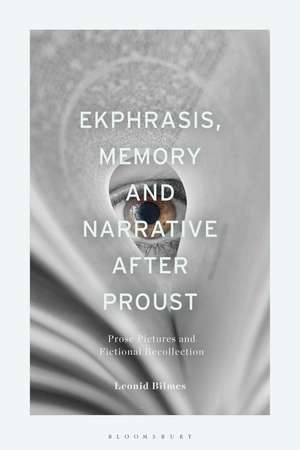Ekphrasis, Memory and Narrative after Proust: Prose Pictures and Fictional Recollection
Autor Leonid Bilmesen Limba Engleză Paperback – 24 iul 2024
| Toate formatele și edițiile | Preț | Express |
|---|---|---|
| Paperback (1) | 191.67 lei 6-8 săpt. | |
| Bloomsbury Publishing – 24 iul 2024 | 191.67 lei 6-8 săpt. | |
| Hardback (1) | 510.83 lei 6-8 săpt. | |
| Bloomsbury Publishing – 11 ian 2023 | 510.83 lei 6-8 săpt. |
Preț: 191.67 lei
Preț vechi: 249.53 lei
-23% Nou
Puncte Express: 288
Preț estimativ în valută:
36.68€ • 37.89$ • 30.53£
36.68€ • 37.89$ • 30.53£
Carte tipărită la comandă
Livrare economică 25 martie-08 aprilie
Preluare comenzi: 021 569.72.76
Specificații
ISBN-13: 9781350336872
ISBN-10: 1350336874
Pagini: 256
Ilustrații: 10 bw illus
Dimensiuni: 156 x 234 x 25 mm
Greutate: 0.35 kg
Editura: Bloomsbury Publishing
Colecția Bloomsbury Academic
Locul publicării:London, United Kingdom
ISBN-10: 1350336874
Pagini: 256
Ilustrații: 10 bw illus
Dimensiuni: 156 x 234 x 25 mm
Greutate: 0.35 kg
Editura: Bloomsbury Publishing
Colecția Bloomsbury Academic
Locul publicării:London, United Kingdom
Caracteristici
Examines the influence of Proust on a range of widely-studied European, American and British authors
Notă biografică
Leonid Bilmes is an independent researcher based in Spain. His writing on contemporary literature and philosophy has appeared in Textual Practice, Philosophy Now and Los Angeles Review of Books. He has recently contributed a chapter to Fictional Worlds and Philosophical Reflection, a collection edited by Garry L. Hagberg.
Cuprins
List of Illustrations Acknowledgements Introduction: On seeing prose pictures 1 Proust's way: Ekphrasis, memory, narrative 2 After Proust: By way of ironized nostalgia 3 Description and narration in Vladimir Nabokov's Ada or Ardor 4 Narration's looming of the archive in W.G. Sebald's Austerlitz 5 Retrospect, prospect and the fiction of the face in Ben Lerner's 10:04 6 Commemoration via intermedial lamination in Ali Smith's How to be both 7 Writing forgetting in Lydia Davis's The End of the Story Conclusion Works Cited Index
Recenzii
Ekphrasis, Memory and Narrative After Proust explores the uses of ekphrasis, and develops the poetics of image/text in contemporary critical and literary work. The fair discussion of the main theories on the subject is developed in subtle close readings of works by Marcel Proust extended to contemporary novels. A highly readable book that will be a precious tool for future research.
How do we remember? In images, or in words? In seeing, or in hearing? Leonid Bilmes's compelling, fluent and sophisticated book responds to these conjoined questions by tracing the influence of Proust on a range of writers - Samuel Beckett, Vladimir Nabokov, W. G. Sebald, Ben Lerner, Ali Smith and Lydia Davis - all of whom think in what are here called 'prose pictures'. What results is not only a fresh and elegant reading of this group of writers, but a bold new theory of the relation, in prose fiction, between remembering, looking and listening.
Leonid Bilmes's far-reaching study of how memory's elusive visions are captured in words takes Proust's In Search of Lost Time as its focus. It offers illuminating readings of Nabokov, Sebald, Ben Lerner, Ali Smith and Lydia Davis, resulting in an accomplished reflection on the theory and practice of mnemonic ekphrasis.
This incredibly and singularly brave book is, as I lift its last word, truly "far-seeing." Compelling in its awareness, its energeiac espousal of critical engagement with narrational watching as hearing, the intermediality Bilmes practices seems to leave out no one we care about thinking with: Benjamin, Derrida, Blanchot, Barthes, Ricoeur, and on. Way on.
How do we remember? In images, or in words? In seeing, or in hearing? Leonid Bilmes's compelling, fluent and sophisticated book responds to these conjoined questions by tracing the influence of Proust on a range of writers - Samuel Beckett, Vladimir Nabokov, W. G. Sebald, Ben Lerner, Ali Smith and Lydia Davis - all of whom think in what are here called 'prose pictures'. What results is not only a fresh and elegant reading of this group of writers, but a bold new theory of the relation, in prose fiction, between remembering, looking and listening.
Leonid Bilmes's far-reaching study of how memory's elusive visions are captured in words takes Proust's In Search of Lost Time as its focus. It offers illuminating readings of Nabokov, Sebald, Ben Lerner, Ali Smith and Lydia Davis, resulting in an accomplished reflection on the theory and practice of mnemonic ekphrasis.
This incredibly and singularly brave book is, as I lift its last word, truly "far-seeing." Compelling in its awareness, its energeiac espousal of critical engagement with narrational watching as hearing, the intermediality Bilmes practices seems to leave out no one we care about thinking with: Benjamin, Derrida, Blanchot, Barthes, Ricoeur, and on. Way on.
